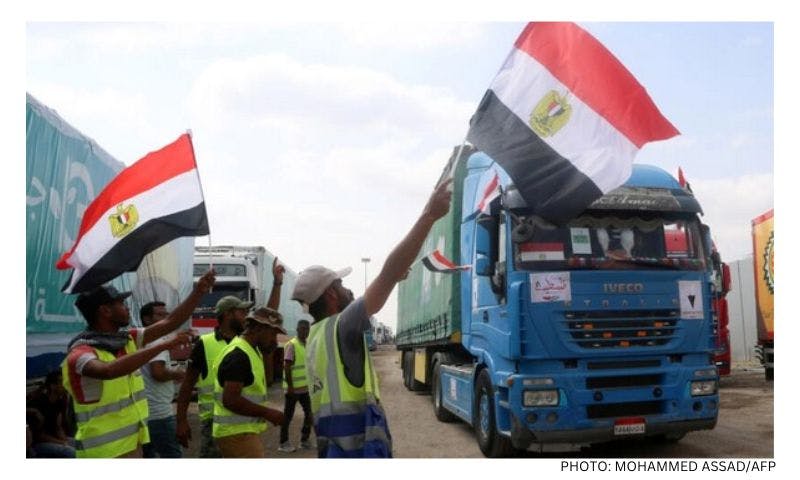Published: 28 October 2019
Last updated: 4 March 2024
IN 2011, ZIYAD NAJAR, a sheep herder living with his family in a cave in the West Bank's south Hebron hills, could not believe what he heard about solar energy from the head of the Israeli NGO Comet-ME.
"We weren't convinced you could get electricity and lights from the sun," recalled the olive-eyed farmer. "When Comet told us so, we were shocked."
Najar and his family and the other residents of Shaeb al-Buttum quite literally lived in the darkness, with no electric lights, televisions or refrigerators. Women spent much of the day churning butter by hand, shaking it up in goatskins.
Children couldn't do their homework at night. Now, thanks to Comet-ME, they and residents of 80 other Palestinian communities and enclaves in the West Bank are hooked up to the world and can just flip a switch.
It's a quiet revolution by left-wing Israelis that is dealing a palpable blow to their own government's 52-year-old occupation of the West Bank, which is otherwise grinding on with no end in sight.
By helping vulnerable Palestinians stay put, Comet has set back hopes on the Israeli Right that they could be pressed to leave rural area C, under full Israeli control and home to the settlements, and relocate to the cities of area A, in the Palestinian self-rule enclaves, like nearby Yatta. In practice Comet, which marked its tenth anniversary in October, is an active player in the turf battle over what self-rule agreements define as area C.
That is land that Palestinians view as the vital hinterland of their future state but which a growing number of Israelis want to annex. Israel considers much of the Palestinian building in area C to be illegal because it lacks permits. However, these permits are virtually impossible to obtain.
Comet's foreign backing, from Germany, the Netherlands, Britain and Ireland, appears to make authorities think twice before decisively interdicting its work.
"Comet has definitely made life easier and helped people stay on the land," says Nidal Younes, elected head of the local council, in an interview at Comet's headquarters in the south Hebron hills, which has a demolition order against its turbine and solar panels.
It neighbours the hamlet of Susiya, all of whose residences face demolition orders. "Before there was electricity many people went to Yatta because life was so hard," Younes says. The group also installs clean water systems.
Comet's foreign backing, from Germany, the Netherlands, Britain and Ireland, appears to make authorities think twice before decisively interdicting its work. The biggest confiscation came in 2017 near Bethlehem when soldiers ripped out electrical equipment that was returned after a three-month legal, diplomatic and media battle.
The Civil Administration, which did not respond to questions for this article, has issued 19 demolition orders against Comet microgrids. None have thus far been implemented, and confiscated equipment is generally returned after legal appeals. "Legal and diplomatic activity enable us to continue doing our work," says Tamar Cohen, the group's organisational development manager.
Comet intends to encompass all off-grid communities in area C, working its way north of Ramallah after covering the southern West Bank and the Jerusalem corridor. "The idea is to provide universal access in area C," says general manager Elad Orian, who oversees a staff of 16 Israelis and Palestinians.
[gallery columns="1" size="large" ids="31709"]
In Shaeb al-Buttim, the population has jumped from 20 to 34 families since electricity was made available, says Najar, who has moved from his cave to a more modern dwelling. "The village was on its way to dying and electricity enlivened it," he said. The opening of a school there through ninth grade has also strengthened it.
Television has made a big difference for adults and children alike, Najar said. "People started to know what's going on in neighbouring countries and around the world. They got a sense of communication and feel in touch with people from other countries."
Mona Najar, Ziad's sister in law, says the electricity has enabled her to take a rest in the afternoon. Churning butter used to take her four hours. Now, with a machine, it is a half hour job. But she doesn't feel that electricity has changed the traditional patriarchal ways of the area. "The women do all the work around the house and with the children of the house," she says.
Comet installs the systems for free and charges users roughly the same rate as Israelis or urban Palestinians pay. "We are a hybrid of a grass roots NGO and a small utility," Orian says.
It all started in 2007, when Orian, then a student and an anti-occupation activist in Hebron and his friend Noam Dotan, a successful high-tech entrepreneur who also was active in Hebron, tried to think of meaningful ways to help the Palestinians that could draw on their skills.
Each had a background in physics. They conducted a needs survey in the south Hebron hills and found electricity, water and fodder at the top of the list. They began working out of Noam's garage and assembled an electricity system powered by solar energy in Susiya.
In 2009, Comet formally came into being, registering in Israel and receiving financial support from the German government. Orian says it is actually doing what the Israeli authorities are obligated to do as an occupying power.
"The provision of basic energy services is demanded by international law of an occupying power. Israel doesn't do it but there is some understanding that there is a limit to how much they can fight against people who just want to have lights."
Gerald Steinberg, head of the right-wing group NGO Monitor, views Comet as more of a player on the Palestinian side in the West Bank land struggle than anything else. Its actions, he says, reflect pro-Palestinian policies of its donor nations. "It's about taking over land and it's a vehicle by which governments that fund them play a political role by claiming and using land.
“Solar energy installations are land grabs. They are vehicles by which the Palestinians with European backing claim areas the Israeli government says are illegal for building."
Steinberg says Comet is able to succeed because Israel is reluctant to get into confrontations with the NGO's European backers. "Often the calculation is made that the diplomatic costs are too high and they just let it go."
Orian, for his part, has little patience for those who brand Comet's work illegal or as encouraging illegal squatting and building. "We don't tell people where or how to live but electricity is a basic human right. If people don't have access to energy, we provide them with that access."
READ MORE
Israel eyes sunlight to power whole country (Ynet)
RELATED
Power returns to Palestinian village after solar panels seized by Israelis (The Jewish Independent)
Far-right Jewish violence goes unpunished (The Jewish Independent)
Main photo: South Hebron Hills, West Bank (courtesy of Comet-ME)




